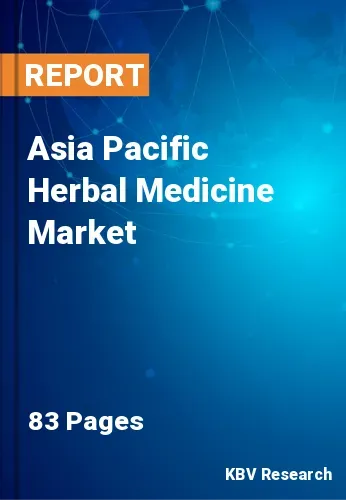The Asia Pacific Herbal Medicine Market would witness market growth of 8.4% CAGR during the forecast period (2023-2030).
Herbal medicine finds its roots in ancient healing traditions across the globe. Traditional treatment systems, such as Ayurveda in India, Traditional Chinese Medicine (TCM), and Native American herbalism, have long relied on plant-derived remedies to restore balance and alleviate illnesses. The pharmaceutical industry has increasingly recognized the therapeutic potential of herbal compounds. Active ingredients extracted from medicinal plants are being incorporated into pharmaceutical formulations, leading to the development of these medicines that meet modern regulatory standards. This integration has expanded the scope of these medicine in treating various conditions, from common ailments to chronic diseases.
Herbal extracts and botanicals are integral to the booming nutraceutical and dietary supplement industry. Consumers seeking natural alternatives for maintaining wellness and preventing health issues take herbal supplements. These products often combine traditional wisdom with scientific research to offer a holistic approach to health and well-being. The cosmetic and personal care industry has witnessed a surge in herbal formulations. Plant-derived ingredients are prized for their skincare benefits, including anti-aging, moisturizing, and anti-inflammatory properties. Herbal extracts, essential oils, and botanicals are increasingly featured in various skincare and beauty products.
Asia Pacific has a rich heritage of traditional medicine systems, including Ayurveda, Traditional Chinese Medicine (TCM), Kampo, and traditional healing practices from various cultures. according to the International Trade Administration, biopharmaceuticals account for approximately 15% of drug sales in Japan, whereas biopharmaceutical sales account for approximately 30% of all pharmaceutical sales globally. Biopharmaceutical companies in Japan can engage in research to explore the therapeutic potential of herbal compounds. This research can lead to identifying bioactive molecules in herbs that may have applications in biopharmaceutical drug development. Therefore, the factors mentioned above will propel the market growth in this region.
The China market dominated the Asia Pacific Herbal Medicine Market by Country in 2022, and would continue to be a dominant market till 2030; thereby, achieving a market value of $31,382.8 million by 2030. The Japan market is registering a CAGR of 7.7% during (2023 - 2030). Additionally, The India market would showcase a CAGR of 9% during (2023 - 2030).
Free Valuable Insights: The Global Herbal Medicine Market is Predict to reach $342 Billion by 2030, at a CAGR of 7.9%
Based on Application, the market is segmented into Pharmaceutical & Nutraceutical, Personal Care & Beauty Products, and Food & Beverages. Based on Form, the market is segmented into Tablets & Capsules, Liquid & Gel, and Powder. Based on countries, the market is segmented into China, Japan, India, South Korea, Singapore, Malaysia, and Rest of Asia Pacific.

By Application
By Form
By Country
Our team of dedicated experts can provide you with attractive expansion opportunities for your business.

